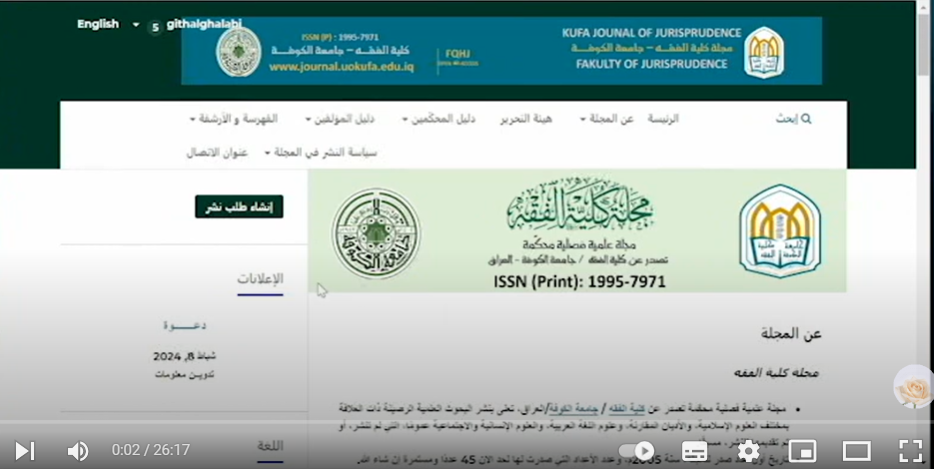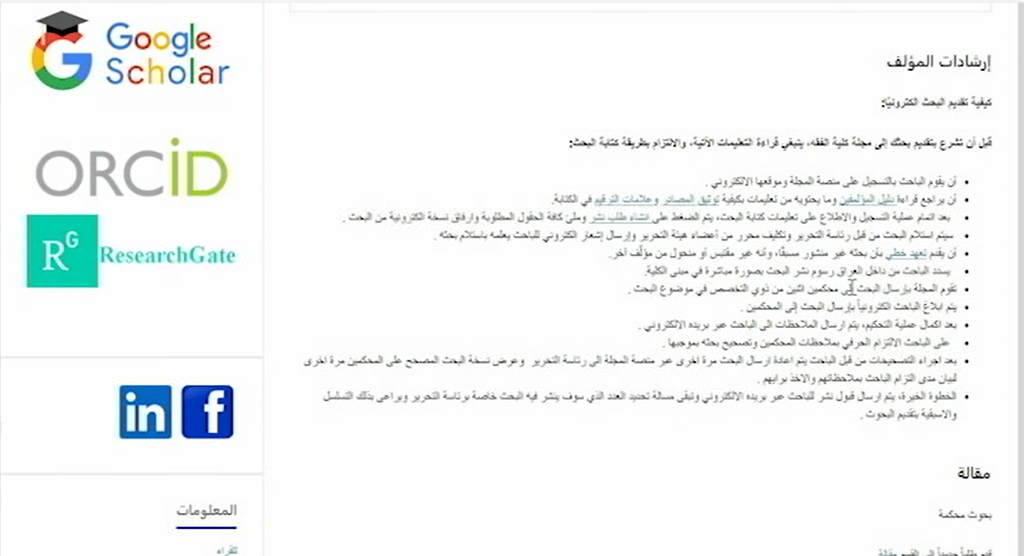Guide for Reviewer
The Journal of Jurisprudence Faculty hopes that the scientific reviewer/evaluator will help researchers improve their research paper and enrich it with the scientific experience he has in his field of specialization. Therefore, his evaluation report should contain clear instructions and clear additions for the researcher, especially with regard to the places of amendments from the body of the research or its margins. As for comments that the researcher does not want to see, the evaluator can send them to the editor-in-chief directly and confidentially, noting that scientific evaluation varies from one evaluator to another, and the editor-in-chief may present the research to another evaluator and then compare the results of the evaluation among them. To make his final decision on accepting or rejecting the research.
In order to conduct the arbitration process on time, the arbitrator should follow his account on the magazine’s platform and install the email application on his phone. To be constantly informed of the notifications he receives, and if he does not have enough time or desire to evaluate a research, he must inform the journal as soon as possible. So that she can send the research to another evaluator, in order to preserve her obligations and take into account the researcher’s time.
The Journal of the College of Jurisprudence encourages the scientific evaluator to constructively criticize the research, and to demonstrate pure scientific objectivity in his report, such as the sequence in building the structure of the research, the correctness of the researcher’s methodology in presenting the introductions and results, the extent of the originality of his research and its scientific importance... etc.
The Journal of Jurisprudence Faculty welcomes distinguished professors who have academic experience in their precise field of specialization, and who have the ability to deal with electronic arbitration, whether from inside or outside Iraq, and who have a desire to be part of its arbitration team, to write down their information in this form, noting that The evaluation process for research from outside Iraq is free, because publishing it in our journal is also free, but the journal will provide the evaluator with a letter supporting his evaluation.
They have great thanks and respect.
Based on the above, the Journal of Jurisprudence Faculty advises honorable arbitrators, before they accept the evaluation of the research and adhere to its instructions, to review the following points:
Ensure that the title of the research, and the content of its summary, match or are close to its precise scientific specialty, or its general specialty, at the very least.
After he accepts the arbitration process, he should download the research to his device, begin reading it carefully, and mark his comments or amendments on the file (by placing his comments in parentheses and in a color different from the text of the original research, so that the researcher can pay attention to them after returning the research to him).
He saves the research file in its new - modified - form, then fills out the evaluation form electronically and includes his final comments, whether for the researcher or the editor-in-chief.
He uploads the modified search to the site in the Attach File box, then chooses his final recommendation on accepting or rejecting the search, and ends the arbitration process by pressing the (Complete) button.
Here, the arbitration process ends, and a direct email is sent to the editor-in-chief informing him of the end of the arbitration process.
After receiving the research, the editor-in-chief sends it to the researcher; To make amendments to him, provided that he adheres to them literally and accepts them in their entirety.
After the researcher finishes making modifications to a research paper, he returns it to the journal in its authenticated form, and here the editor-in-chief scrutinizes the modifications and the extent of the researcher’s commitment to them.
All stages of the arbitration or evaluation process take place electronically and at specific times.









